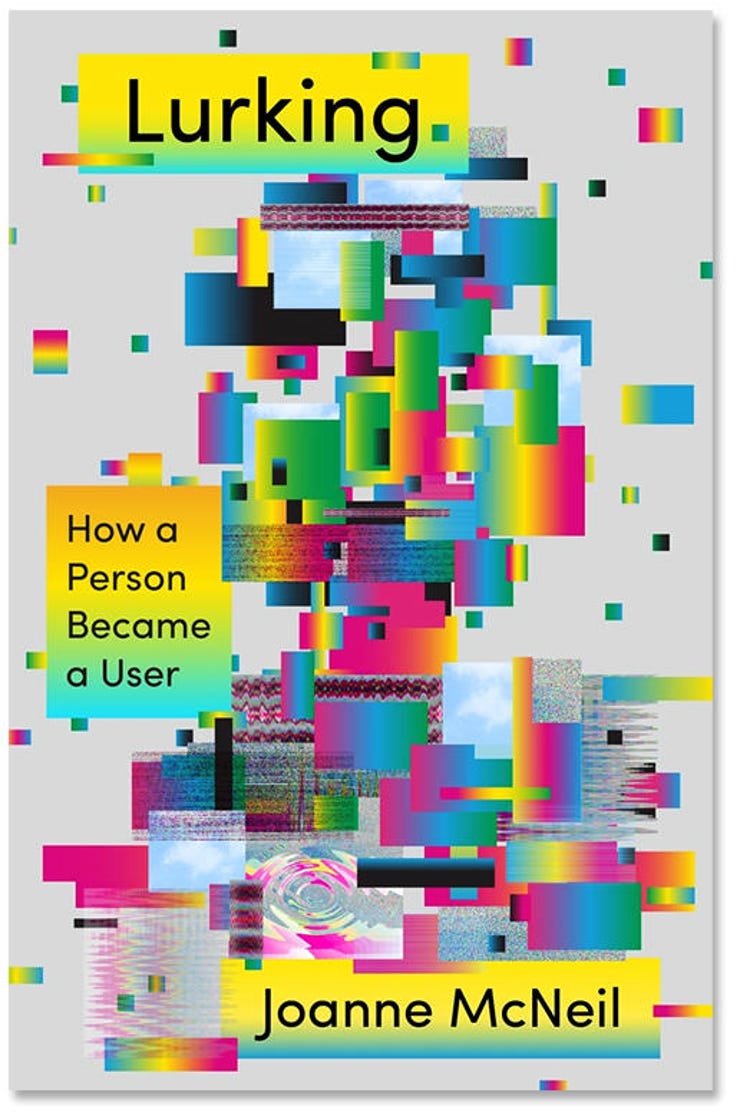Lurking, book review: A people's history of online culture


Lurking: How a Person Became a User • By Joanne McNeil • Farrar, Strauss and Giroux • 292 pages • ISBN: 978-0-374-19433-8 • $28
Ever since the first two modems mated, only about 10% of visitors to any online forum ever post – and the vast majority of those postings come from the top 1% in a highly unequal power-law distribution. Everyone else...lurks. They read, they watch, they go back to what they were doing, silently. To be fair, lurking is not evenly distributed: someone who lurks on one site may be one of the most active posters on another, but I'm not aware of research studying that sort of behavioural variation.
Despite its status as a majority activity, lurking has attracted very little attention in general as a topic worthy of study. Until now: Joanne McNeil's Lurking: How a Person Became a User, goes back to the earliest days of online interaction to reframe internet history as our story, as we experienced the profound power shift that has taken place.
The promise in the 1990s was an internet that empowered individuals at the expense of large companies; the reality in 2021, after a couple decades of creeping change, is an internet in which large companies are overwhelming everything, online and off. Eventually we're all lurkers on this bus.
SEE: Hiring Kit: Market research analyst (TechRepublic Premium)
We ourselves laid ourselves open by wanting a technically easier life. The user control of the 1990s internet came with profound technical challenges – no wonder we fled to the handful of sites that offered to do all the hard stuff for us. In a discussion of the GirlGamers subReddit, McNeil highlights the advantages to moderator Kat Lo of using Reddit, which functions for the group as a troll filter for their closely controlled Discord server: it's free, and requires no coding, and is both more accessible and less user-controllable than anything available 20 years ago.
Accessibility vs user control
Early systems – McNeil remembers bulletin boards and studies New York's ECHO community, although not San Francisco's more famous The WELL – were hard to learn, but in return users could often write their own tools (one such, on London's CIX, allowed you to go back and read, perhaps to delete, the drunken postings of the night before). Facebook and Twitter don't even provide decent management tools for friends and follower lists.
The disadvantage is that Reddit, which is basically Usenet with a graphical interface and advertising, has what Lo describes to McNeil as "idiot libertarian" founding principles that make it hard for non-conforming groups like intersectional feminists to carve out a comfortable space for themselves.
McNeil does a thorough job of charting both her personal internet history and the profound wider changes that have turned the online world into a vector for collecting raw material – us – for exploitation.
"It is a haunting," she writes of the way old postings we've forgotten take on new forms – for example, old photographs posted for family and friends that are suctioned into databases to train facial recognition systems.
Neither regulation nor decentralisation is enough to fix this internet, McNeil concludes, offering as an alternative model the public library, where librarians mastermind community, curation, and other needs (in New York a homeless person with a job interview can apparently check out a suit jacket or a nice purse) as well as simple access to information.
A place that welcomes, rather than entraps. A place that remains truly public.
RECENT AND RELATED CONTENT
The long demise of Silicon Valley… and its coming rise
Brazilian women in IT negatively impacted by remote working
Is social media an influential technology or an insurrectionist tool?: Status Report
Google employees form Alphabet Workers Union to bring back the 'Don't be evil' motto
Read more book reviews
- Augmented Reality, book review: Exploring the attractive and alarming potential of AR
- The Entrepreneur's Faces, book review: A compendium of startup stories
- Holiday reading roundup: How the future looked, before the pandemic
- Culture Warlords, book review: Into the heart of online darkness
- The Smart Wife, book review: A feminist take on smart home tech